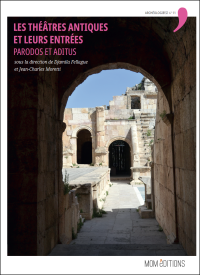Les principaux accès à l’orchestra et aux gradins dans les théâtres et les odéons grecs ou romains étaient partagés par les artistes comme les spectateurs. Essentiels pour l’usage des monuments, ils ont été en grande partie négligés dans la mesure où, comme tout passage, ils se définissent par un vide. Aucun ouvrage ne leur a été entièrement dédié. Aucune synthèse sur le théâtre antique ne comporte de chapitre qui en retrace l’histoire.
Le présent recueil tente de combler une lacune en envisageant l’évolution de ces accès depuis la naissance du théâtre grec jusqu’à la mort du théâtre romain, du Portugal au Proche-Orient. Il comporte sept synthèses régionales et autant de présentations monographiques, regroupées en trois zones géographiques : l’Orient, l’Italie et l’Hispanie, les Gaules et les Germanies.
Ces contributions témoignent de l’importance essentielle de ces passages dans le fonctionnement des édifices de spectacles antiques et la diversité régionale de leur configuration. Elles invitent à s’interroger sur la pertinence même de l’usage des termes « parodos » et « aditus » en soulignant les normes qu’ils véhiculent dans l’analyse architecturale.
Abstract
The main entrances to the orchestra and tiers in Greek and Roman theatres and odeons were shared by both performers and spectators. Essential to the use of the monuments, they have been largely neglected since, like any passageway, they are defined by a void. No work has been devoted entirely to them. No overview of ancient theatre has included a chapter tracing its history.
The present volume attempts to fill this gap by considering the evolution of these accesses from the birth of Greek theatre to the death of Roman theatre, from Portugal to the Near East. It includes seven regional overviews and as many monographic presentations, organized into three geographical areas: the East, Italy and Hispania, Gaul and Germania.
These contributions show the essential importance of these passages in the functioning of ancient performance buildings and the regional diversity of their configuration. They call into question the very relevance of the terms “parodos” and “aditus”, highlighting the standards they convey in architectural analysis.
Année : 2024
Editions : Maison de l'Orient et de la Méditerranée (Lyon)


